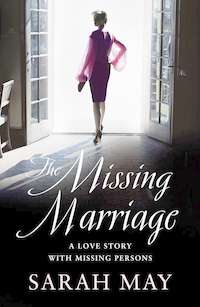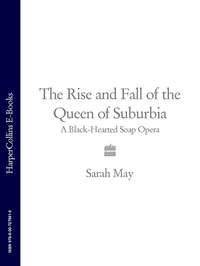
Полная версия
The Rise and Fall of a Domestic Diva
‘Why were you asking—?’ she joked. Then, before Kate had time to respond to this, said, ‘Is it still okay for you to take the boys swimming tonight and pick them up?’ She tried not to sound desperate, knowing from experience how off-putting desperation was but, since Peter’s death, she seemed to be perpetually desperate, and perpetually having to conceal it was draining.
When Kate didn’t respond to this, she prompted her, ‘The boys? Swimming?’ and waited.
‘Swimming?’ Kate’s voice sounded vague and preoccupied.
‘You were going to take the boys to Swim School after nursery and then I was going to pick Arthur up from yours around six?’
Silence, as Kate rapidly processed these facts as if she was hearing them for the first time, which she wasn’t. ‘Fine—yes, that’s fine. Robert’s going to pick the boys up from swimming.’ She made a mental note to remind Robert.
Jessica, trying not to cry with relief, missed what Kate said next. ‘What’s that?’
‘I said maybe I am interested.’
‘In what?’
‘Taking a look at Beulah Hill.’
‘You’re thinking of moving?’
‘Possibly.’ Kate’s only appointment that morning had been a teenage schizophrenic, so she’d spent most of her time after printing off a map of the St Anthony’s catchment area, as well as two copies of the appeal form, on Rightmove. By the time she discovered that the only property with at least three bedrooms under seven hundred thousand and within the catchment area was No. 8 Beulah Hill, a dull thumping sensation had started somewhere just behind her left temple, and she knew that at some point that day she would have a migraine.
‘But you’ve got a lovely house.’
In the silence that followed, Kate realised that Jessica was waiting for some sort of explanation. ‘We were thinking of buying something abroad,’ she lied—another lie. ‘Maybe downscaling in London, cashing in on some capital and getting somewhere in France—to take the kids in the holidays.’
‘Well, how much were you thinking of spending?’ Jessica said, thinking that at least the Hunters would be around in the term-time still. Kate was the only person she knew who ever offered to help with Arthur.
‘Around four fifty?’
‘This is on for four eighty.’
‘I know, I’ve been looking at it on Rightmove. How long’s it been on the market for?’
‘Over six weeks.’
‘So you haven’t been able to shift it.’
‘Well, I’ve got a young couple here at the moment…you never know: people are unpredictable.’
There was undisguised panic in Kate’s voice as she said, ‘What about this afternoon? Could I take a look this afternoon?’
‘This afternoon?’ Jessica laughed. ‘I can’t—I’m booked through to five thirty. I think everybody in the office is.’
‘What about now?’
‘Now?’
‘I can be there in under ten minutes.’
‘I don’t know…’
‘Come on, Jessica.’
‘I’ll give you ten minutes then I’ll have to go—I’ve got another viewing.’
‘I’ll be there.’
Jessica was about to call off when Kate said, ‘Wait—I meant to ask. Did you get your letter?’
‘What letter?’
‘The St Anthony’s letter?’
‘No idea—I left before the post. Did Findlay get in?’
‘He did.’
‘Well, I hope to God Arthur gets a place then. They’re almost like brothers—he’ll be distraught if he and Findlay get separated.’
Kate tried to think of something to say—a statement like this warranted something—but she couldn’t. Arthur Palmer swore; Arthur Palmer looked malnourished; Arthur Palmer’s hair was too short, his clothes inflammatory. Arthur Palmer was all wrong and Kate had done everything she could to separate him and Findlay, but nothing worked. Ros Granger and Harriet Burgess had both commented on this—smugly—but no matter how hard Kate tried to push Findlay in the direction of Toby and Casper, Findlay refused to have anything to do with either of them.
When Kate failed to respond, Jessica said, ‘So it’s definitely okay for you to pick Arthur up after nursery?’—getting back to her primary concern.
A moment’s hesitation, as Kate fought to remember the complicated logistics involving her own children and Jessica’s, then, ‘Yes—fine. Okay, I’m leaving now.’ Kate called off.
Jessica hadn’t heard the young couple come back downstairs, and now they were standing in front of her, and she could tell from the way the man said, ‘So how long has it been on the market for?’ that he’d already asked her once, maybe even more than once.
‘Not long,’ Jessica said.
‘How long?’ he insisted.
‘Just over a week,’ she lied, ‘which is why we haven’t got round to printing details yet—and, to be honest, properties like this are going so fast, nine times out of ten we don’t even get round to printing details. A lot of the properties don’t even make it onto the Internet.’
The man was staring at the oil painting of Jesus on the wall opposite, unconvinced.
Jessica was about to give them the whole spiel on getting the loft converted into a fourth bedroom with en-suite, and how unusual it was to find a seventy-foot garden in this area, when Mr Jackson, the elderly Jamaican vendor, shuffled into his home carrying a blue plastic bag with two cans of Kestrel inside.
‘Y’all right?’ he smiled awkwardly at them all. ‘Sorry—I stayed out; thought you’d be done by now.’
‘Don’t worry, we’re just leaving, Mr Jackson,’ Jessica said as brightly as she could.
Mr Jackson carried on staring at them all, confused by the whole process. ‘That’s my wife,’ he said after a while, following the young man’s gaze and pointing to the picture of Jesus.
The young man nodded and smiled and tried not to look scared.
‘She was the one what had the religion.’ Mr Jackson paused. ‘She died,’ he added, looking hopefully at them all, as if one of them might have heard otherwise.
The young man mumbled, ‘Sorry to hear it,’ and started to propel his partner towards the hall.
Jessica followed them out.
Mr Jackson stayed where he was. ‘Y’all goin?’ he said to the empty room.
On the pavement outside No. 8, she shook hands with the young couple as a fleet of motorised scooters raced up the road behind them.
‘I’ll be in touch,’ she called out enthusiastically, watching the couple get into their car and start to argue.
No. 8 Beulah Hill was a bargain—if she had the money, she would have bought it herself. All it needed was thirty to fifty thousand pounds of work done on it and it would be worth over six hundred and fifty, but nobody seemed to have the imagination to see beyond Mr Jackson and the Jackson décor. People these days wanted to walk into readymade lives. Her phone started ringing again.
It was Kate.
‘Still there?’
‘Still here.’
‘Great—I’m just round the corner. Oh, and Jessica, I meant to say—you’re the only person I’ve told about the whole downscaling/second property in France thing, so…’
‘Don’t worry, I won’t say anything.’
‘To anyone.’
‘To anyone.’
‘Great.’ A pause. Then again, ‘Great.’
By the time she came off the phone, the silver BMW containing the young couple had slid away. She turned and knocked on the door of No. 8 again—to see if it was okay to do the viewing with Kate now.
After a while, she rang a second time, and Mr Jackson appeared in the door, the blue carrier bag still in his hand, staring blankly at her. He looked as though he’d been crying.
‘Mr Jackson? It’s Jessica, Mr Jackson—Jessica from Lennox Thompson Estate Agents?’
He nodded patiently at her—without any apparent recollection.
She turned and pointed to the Lennox Thompson For Sale sign attached to his gatepost.
‘It’s Jessica, Mr Jackson,’ she said again, glancing at him standing in his doorway staring at the Lennox Thompson For Sale sign as though he’d never seen it in his life before. ‘I’ve got someone who wants to see the property.’
‘The property,’ he repeated, grinning to himself.
‘Yes, the property—your house—now. If that’s okay with you?’
‘They want to see it now?’
‘They want to see it now—is that okay?’
Mr Jackson sighed, shaking his head and disappeared back inside without shutting the front door.
‘Mr Jackson?’ Jessica called out.
Then the Hunters’ Audi estate pulled up and Kate got out panting, as though she’d been running, not driving.
‘Jessica—thanks so much.’
‘Are you serious about this?’
‘I just want to take a look,’ Kate said, her eyes once more skimming the peach-coloured window frames and impenetrable layers of net hanging at the windows.
‘It needs work doing to it—about thirty grand’s worth. Nothing structural—mostly cosmetic. Sorry, we’re going to have to be quick, I’m meant to be somewhere else.’
Jessica gave Kate the tour.
Mr Jackson remained motionless on the sofa watching a Gospel channel.
‘I’ll be in touch,’ Jessica called out to him as they left the house.
There was no reply from Mr Jackson.
‘Well, I’m definitely interested,’ Kate said on the pavement outside No. 8.
‘Have a think about it.’
‘I’m definitely interested,’ she said again.
‘Well, talk to Robert -.’
‘I’m going to.’ She nodded to herself then swung back to Jessica. ‘What are you doing tonight?’
‘Tonight? Nothing.’
‘Why don’t you come to the PRC meeting?’
‘I didn’t know there was a PRC meeting.’
‘Didn’t Harriet phone you?’
Harriet hadn’t phoned for some time. In fact, Jessica hadn’t been to the last three PRC meetings. ‘No.’
An awkward silence. Jessica was one of those people it was almost impossible to lie to. ‘Harriet’s probably just lost your number or something. You know what she’s like.’
Jessica didn’t respond immediately. ‘Look, I’ll let you know—I’ll see how Ellie’s day’s been, and if she minds me leaving Arthur with her.’ She paused, looking suddenly pleased. ‘Are you sure?’
‘Course I’m sure. It’s an important one tonight—about the street party.’
‘What street party?’
‘The street party we’re having in June.’
‘Oh. Okay—well, I’ll call you.’
Even though she was late, Jessica stayed on the pavement waving stupidly at the disappearing Audi before getting into her own car.
Watching her in the rear-view mirror, Kate felt a stab of regret.
What had incited her to invite Jessica to the PRC?
Harriet had an almost pathological hatred of Jessica Palmer, whose misshapen life filled Harriet with horror. She treated her as though tragedy was contagious, because even dullwitted Harriet realised that the grief that comes with tragedy has the ability to shape lives in a way happiness never does.
Sighing, Kate turned the corner onto Lordship Lane.
Jessica sat for a while, listening to a dog barking somewhere close by, then turned the keys in the ignition.
Twenty minutes later, she walked into the newly openplanned offices of Lennox Thompson.
Most of the staff were out on viewings or valuations—apart from Elaine and the manager, Jake, who was almost ten years Jessica’s junior, on the Oxford Alumni, and seriously addicted to coke, which gave his skin a grey pallor that was only heightened by being perpetually offset against the white shirts he insisted on wearing.
Jake thought Jessica and him had things in common—primarily their education—which led him to keep up a repartee with her that was at once fraternal and elegiac.
Jessica knew it wasn’t Oxford they had in common—it was tragedy.
In Jake’s case, the fatal error of perpetually trying to impress parents who had never learnt how to love their children—he once told her his father used to make him weed the borders naked, as a punishment.
In Jessica’s, never having made any provision—emotional or material—for Peter’s untimely death.
‘Guess what?’ Jake said, looking up as Jessica walked into the office.
‘What?’
‘They’re opening a branch of Foxtons here.’
‘Foxtons?’
He nodded, pulled at his nose and said, ‘With a promotional six-month zero per cent commission. It’s going to kill us,’ he added, starting to chew on his nails before shunting his chair backwards and disappearing, jerkily, towards the loos at the back of the office.
Elaine looked across at her.
Jessica was about to say something when her mobile started to ring.
‘Jess?’
It was Lenny—her stepmother.
She didn’t feel like speaking to Lenny right then and started to scratch nervously with a drawing pin at the edge of her desk.
‘I was just phoning to see if Arthur got into St Anthony’s.’
‘I don’t know—the post hadn’t arrived when I left this morning.’
‘Oh.’ Lenny paused at Jessica’s flat tone.
Jessica let herself fall back in her chair, slouching uncomfortably as she started to swing it from side to side.
‘Well, give us a ring later.’
‘I will. How’s Dad?’ she said, with an effort.
The line started to break up and Jessica, now swinging aggressively from side to side, hoped they’d lose the reception altogether, but Lenny was still there. It was something she’d been trying to come to terms with since she was fifteen—the fact that Lenny would still be there—always.
‘I said—how’s Dad?’
‘He’s fine—engrossed in some new cat-deterrent he got by mail order this morning.’
At the beginning, because of what happened between Joe and Lenny, it had been more necessary for Lenny to get on with Jessica than it was for Jessica to get on with Lenny, and this early imbalance in their relationship had never really been redressed. Lenny had made huge efforts—Jessica could see that now, from the vantage point of being thirty-five—and not only out of necessity. Lenny had genuinely cared, but at the time Jessica felt she was owed too much to bother responding to overtures made by the woman her father had been having an affair with while her mother was still alive, who became the woman he moved in with after she died.
‘You keep cutting out—where are you?’
‘I don’t know—somewhere between Brighton and Birmingham; on a train. How’s work?’
‘Fine—yeah, it’s fine.’
‘Well, you know where we are if you need anything—why not bring the kids down and have a weekend to yourself?’
‘I don’t know—it’s busy at the moment.’
‘We haven’t seen them in ages, and Dad’s started on that tree house for Arthur.’
Jessica tried to think of something to say to this, but couldn’t.
‘And I miss Ellie—I really do.’
‘I’ll call,’ Jessica said, as the line broke up for a third and final time.
As she came off her mobile, the office phones started to ring. ‘Lennox Thompson sales department—how can I help you?’
‘I’d like to speak to someone about the Beulah Hill house you’ve got on the market.’
‘Well, you’re speaking to the right person.’
‘Wait a minute—is this Jessica?’
‘This is Jessica—Jessica Palmer.’
‘Jessica—it’s Ros.’
‘Ros?’
‘Ros Granger from No. 188?’
‘Ros…’ Why was Ros calling? Ros never called her…
had never called her since she took Toby to McDonald’s in Peckham that time for Arthur’s fourth birthday. In fact, nobody from the PRC apart from Kate had phoned since Arthur’s fourth birthday—and that was nearly a year ago.
‘So—how’s it all going?’
‘Fine.’
Ros let out a long, smooth laugh as though Jessica had just said something funny. ‘I was phoning to arrange a viewing -.’
‘You’re not thinking of moving as well, are you?’
‘Who else have you been speaking to?’
‘Nobody,’ Jessica said quickly.
Ros paused. ‘Today would be good.’
Chapter 8
Even late as she was after the impromptu Beulah Hill viewing, Kate still found time to stop at St Anthony’s vicarage on the way to Village Montessori. Jolting over a speed bump at the crest of the hill, she was sure she saw someone—the vicar?—in the vicarage garden, and on an impulse decided to stop, parking behind a distinctive black Chrysler just pulling away, which—if she hadn’t been so preoccupied—she would have recognised as Evie McRae’s.
She got out of the car and started to walk through the dull April drizzle, trying not to slip on the overspill of gravel from the vicar’s newly gravelled drive. Ignoring the increasingly invasive smell of wet tarmac, which always made her panic, she emerged from behind a bank of hydrangeas with what she liked to think of as a healthy smile on her face.
‘Hi,’ she said across the uneven trail of hydrangea cuttings littering the immaculate lawn.
The Reverend Tessa Walker—it was the vicar—looked up, a pair of secateurs in her hand. She managed to master her annoyance at the interruption—the second interruption that morning—but it left her face looking glum.
After what felt like a minute’s silence, Kate said, ‘Sorry—this is a bit impromptu; I should have phoned. Actually, I did phone, but no one was in and then I was driving past and I saw you in your garden and…’ She inhaled a lungful of wet tarmac and then panic set in as the memory of long wet suburban days fell over her…She stared blearily at the Reverend Walker, trying to claw her way back into the present moment. ‘I tried to phone, but there was no answer and…’
The Reverend Walker lost the grip on her secateurs so that they hung from the band round her wrist. She didn’t attempt to speak; she just carried on staring at Kate.
‘I’m Kate—Kate Hunter? I come to church here on Sundays. Every Sunday…here to St Anthony’s every Sunday—well, most Sundays…’ She paused, letting out a nervous laugh that made her feel like the only child in a roomful of adults.
The Reverend Walker said nothing. She was too busy thinking…this woman comes to my church every Sunday and I don’t recognise her. It made her feel old.
The drizzle was gaining momentum. There was going to be a downpour, which hadn’t started yet, but there was so much moisture in the air that Kate could feel it collecting on her eyelashes.
The sound of children being let out onto a playing field reached them through the dense, moist air and she started to panic again. Nursery—she needed to collect Findlay and Flo from nursery. ‘I came here to talk about a child,’ she said suddenly. This sounded epic; she hadn’t meant to sound epic.
The Reverend Walker said, ‘A child?’
‘My son—Findlay.’
‘You want to talk to me about your son?’ the Reverend Walker said, helplessly. Was this the first time the woman had mentioned a child? She didn’t know any more. It just seemed as though she’d been standing on her wet lawn among the hydrangea cuttings for weeks, and now wasn’t a good time for anybody to be talking to her about their children—because she was undergoing a crisis of faith; a profound crisis of faith. With an effort, she twisted back to Kate. ‘You’re having concerns about your son?’ she said, trying to sound less helpless this time.
‘Concerns?’ Kate echoed.
‘Spiritual concerns?’
‘He’s five years old,’ Kate said, trying not to yell. ‘No, it’s nothing like that. I just came to check that you wrote the letter to St Anthony’s confirming the fact that Findlay comes to church here on Sundays. You needed to write a letter—about Findlay. It was part of our application, and I just wanted to check that it was done because I got a letter this morning saying he didn’t get a place.’
A place where? Heaven? Full of a sudden dread, the Reverend Walker wondered whether they were talking about a dead child—the woman’s son? Was he dead? Had there been a funeral she’d forgotten to attend? A child she’d forgotten to bury? She started to walk slowly, earnestly, towards Kate.
‘We’ve been coming here to church since he was nine months old and this morning—this morning—I find out that he doesn’t have a place at St Anthony’s, and nobody seems to know why. Every Sunday—nearly every Sunday—for over four years, and he doesn’t get a place.’
The clouds gathered and the moisture thickened until it officially became rain—the steady sort of rain the birds carry on singing through.
Kate tried to breathe in but there was no air anywhere, her nostrils were full of rain and it seemed as though the Reverend Walker was staring at her from the end of a long green tunnel.
‘We’ve been coming to St Anthony’s every Sunday,’ she said again, before realising that she was repeating herself.
Somebody’s voice—a long way off—was saying, ‘Only fifty per cent of places are offered on the basis of faith; the other fifty are offered according to catchment area criteria and whether a child has siblings at the school. Do you want to come inside?’ the Reverend said at last.
‘We’ve done everything right—everything,’ Kate yelled. ‘Right down to sitting through sermon after sermon on those fucking Sudanese orphans.’ She broke off, vaguely aware that the rain was running so steadily down her face now it was impairing her vision. The right-hand side of her head seemed to be filling with blood, and the weight of it was pulling her down through the rain towards the lawn. She stumbled, but managed to regain her balance. This prompted the Reverend Walker to say, ‘Come inside,’ again.
Kate stared at her, suddenly intensely aware of the fact that she was, in effect, accosting the vicar in her garden. If she took a look around her, the evidence would be there: her footprints in the gravel on the drive, and across the wet lawn behind her. God. This was exactly the sort of thing her mother would have done. God.
The church bells began ringing and, pushing the vicar’s hands away, she turned and ran back across the lawn and gravel drive, her head thumping so badly with migraine now that it was beginning to seriously affect her balance. She staggered towards the Audi. Somewhere beyond the bells there were screaming children and, beyond them, a dog was intermittently whining and yapping.
A workman standing in front of a Portaloo on the drive next door was staring at her. How long had he been standing there?
Ignoring him, she yanked open the driver’s door and fell into the car—the sound of the wet afternoon immediately muffled by safety glass as she slammed the door shut.
What was it she’d yelled at the Reverend Walker? Something about Sudanese orphans…?
Afraid, she phoned Robert, but Robert didn’t answer his phone.
Chapter 9
She pulled up in front of Village Montessori nearly twenty minutes late—which, following stringent regulations, she’d have to pay for by the minute—with a full-blown migraine; but at least the rain had stopped. She retrieved Flo from the sensory room where she was lying on her back with fifteen other babies—who looked as if they’d just been thrown out of heaven, and landed on a rug of synthetic fur—all jerking their arms and legs towards the ceiling where silver spirals were revolving, overlooked severely by the black and white faces on the Wimmer-Ferguson Mind Shapes mural. There was a CD of rainforest sounds playing.
Mary handed her Flo from among the minute bodies jerking on the floor, and Kate wasn’t entirely sure—if it hadn’t been for Mary—that she would have recognised her daughter. The lighting in the sensory room was eerily low and Kate wondered how Mary coped, sitting among the parakeets and the jerking, snuffling bodies, with the door shut. Surely Village Montessori was in breach of EU health and safety regulations?
Once in her mother’s arms, Flo showed absolutely no sign of recognition. It must have been the same with Findlay at this age, but with Flo, for some reason, Kate felt less able to cope. Flo twisted her head blearily from side to side, blinked her wet eyes at nothing in particular, posited a dribble of something white and curdled on Kate’s lapel then concussed herself on her collarbone—and started to cry. Kate felt a wave of violence pass through her that she found difficult to control—because of the migraine.





